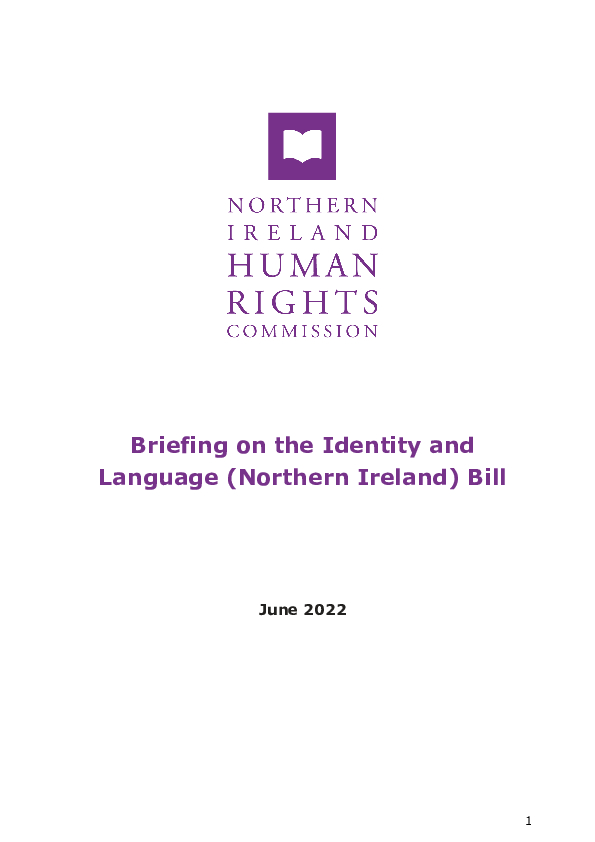NIHRC Briefing on the Identity and Language (Northern Ireland) Bill
Date produced June 2022
Below is a summary of the key issues.
You can also download the full document through the links provided.
1. Definition of public authorities
The Bill confers obligations on specified public authorities in NI to ensure compliance with certain principles when carrying out their functions and to promote adherence to advice from Commissioners. The Bill narrowly defines a ‘public authority’ as any authority listed in Schedule 3 to the Public Services Ombudsman Act (Northern Ireland) 2016. Whereas section 6 of the Human Rights Acts 1998 takes a wider interpretation of ‘public authority’ to include a court or tribunal, or anyone performing a public function, even where a private organisation is providing a public service.
In terms of the practical impact, there are a number of authorities with key roles in public life that would not be subject to the proposed statutory provisions. This includes, the Northern Ireland Office and its Arm’s Length Bodies, the Electoral Office, the Parades Commission and the NIHRC. While it is reasonable to expect that such public authorities will act in good faith and comply with the Bill to the best of their ability, if they are not supported to do so it is likely that their actions will be significantly limited.
The NIHRC recommends the definition of ‘public authorities’ at sections 78F, 78P and 78T of the Northern Ireland Act 1998 (as amended) is amended to reflect section 6 of the Human Rights Act 1998.
2. Functions of the Office of Identity and Cultural Expression and the Commissioners
The NIHRC notes with caution the lack of consistency regarding the functions of the three new authorities. The Office’s functions are framed around a duty to ‘promote’, whereas the Irish Language Commissioner is to ‘protect and enhance’, and the Ulster Scots/Ulster British Commissioner is to ‘enhance and develop’. International human rights standards and associated treaty bodies consistently reaffirm the term ‘promote and protect’ in respect of all human rights and fundamental freedoms.
In addition, only the Ulster Scots/Ulster British Commissioner has an advisory role in respect of the three specified international human rights instruments at section 78R(3) relating to language and culture. Omitted from this list, however, are the UN International Covenant on Civil and Political Rights (UN ICCPR) and UN International Covenant on Economic, Social and Cultural Rights (UN ICESCR) which are central in the protection of national identity and cultural expression.
Finally, where the advisory functions of the new authorities overlap with the NIHRC’s mandate to advise on human rights compliance, the Bill should be amended to require the authorities to consult with the NIHRC in order to ensure complementarity.
The NIHRC recommends that sections 78H, 78K and 78R are amended to include:
- a duty on each of the three authorities to ‘promote and protect’ human rights standards in their work;
- consistent reference to the specified international instruments and that the current list is expanded to include relevant Articles of the UN ICCPR and the UN ICESCR; and
- a duty on each of the three authorities to consult with and take account of advice provided by the NIHRC in respect of their own advisory functions.
3. Independence of Commissioners and Effective Investigations
As currently drafted, the Bill does not contain clear safeguards to ensure the two Commissioners’ independence, particularly that decisions by government bodies are not unduly interfering with the Commissioners’ independence. In fact, both Commissioners are being subjected to more government control than the respective language commissioners in Wales and Ireland. Independence is of particular importance with regards to the Commissioners’ investigatory functions. The NIHRC have made a series of recommendations to ensure the Commissioners have the necessary powers to ensure their investigatory duties are properly and fairly fulfilled.
The NIHRC recommends that:
- sections 78K(4) and 78R(5) are amended to ensure the independence of the Commissioners, either by express statement or by imposing conditions on Ministerial directions (see paras 3.30 and 4.39);
- sections 78O and 78S are amended to provide the Commissioners with powers to initiate ‘own motion’ investigations and to compel evidence in exercising their investigatory powers; and
- Sections 78O and 78S are amended to ensure that public authorities must take seriously the recommendations by the Commissioners, such as ensuring that public authorities’ failure to co-operate with investigations could lead to specific penalties.
4. Ulster British
The NIHRC notes the UK Government’s official recognition of Ulster Scots as a national minority under the Framework Convention for the Protection of National Minorities. Under section 78Q, the Ulster Scots/Ulster British Commissioner has an advisory role in relation to the effect and implementation of the Framework Convention. The NIHRC highlights its concerns over the additional reference to ‘Ulster British’ in the Bill, which is not a term, or a linguistic/national minority group presently recognised by human rights treaty bodies. Through engagement with the sector, we are also aware that it is not a term used within the Ulster Scots community. It appears that Ulster Scots culture is at risk of being conflated with a distinct political identity.
The Advisory Committee on the Framework Convention for the Protection of National Minorities cautions that “while language is generally perceived as an essential marker of identity, language competence or lack thereof, as well as the mere use of a language, must not automatically be linked to affiliation with a particular group”.
The NIHRC advises that the Office of Identity and Cultural Expression may be the more appropriate body to develop work associated with the concept of Ulster British. It recommends that this aspect of the Ulster Scots/Ulster British Commissioner’s remit is given further consideration in consultation with representatives of the Ulster Scots community and that clause 3 of the Bill is amended accordingly.

Download Documents
Your browser is out-of-date!
Update your browser to view this website correctly. Update my browser now